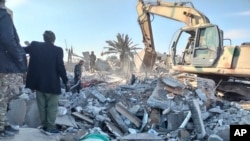U.S. military retaliatory strikes on pro-Iranian militia forces inside both Syria and Iraq early Saturday have prompted condemnation from both the Syrian and Iraqi governments, as well as several countries that are allies of both Damascus and Baghdad.
Syrian Foreign Minister Faisal al-Miqdad said in a statement the U.S. attacks "will seriously increase tensions in the region." Syrian state TV quoted the Syrian defense ministry, which claimed the U.S. "attacked Syrian government forces which are fighting the Islamic State terrorist group," alleging the U.S. is trying to help the terrorists "regroup."
Rami Abdul Rahman, with the Britain-based Syrian Observatory for Human Rights, told Arab media the U.S. attacks targeted pro-Iranian militia and Syrian government forces along the border with Iraq in the area between al-Bukamal and Deir el-Zour, in addition to the Iraqi border post of al-Qaim.
He said that Iranian al Quds Forces, as well as Iranian Revolutionary Guard Forces and pro-Iranian militia forces, were hit in the U.S. strikes on the Syrian border region between al-Bukamal, Al-Mayadeen and Deir el-Zour.
Rahman argues, though, that the militiamen had been alerted to the strikes and were hiding in underground tunnels for the most part.
Iraqi Prime Minister Mohammed Shia al-Sudani declared an official period of mourning for the victims of the U.S. attacks on the pro-Iranian Hashd al-Shaabi militia headquarters in al Qaim and the town of Al Kashat. At least 18 people were killed, according to an Iraqi government spokesperson. The Hashd also claimed to have struck the al Harir U.S. base in the Kurdistan capital of Irbil. That was not confirmed.
Iraqi state TV reported that government spokesperson Bassem al Awadi denied U.S. reports it had consulted with the Iraqi government before the U.S. strikes, claiming the U.S. was "trying to mislead world opinion," adding that the U.S. attacks "put Iraq on the brink of a precipice."
The Iraqi parliament convened an urgent session to discuss the "repercussions of the U.S. strikes," and the "presence of foreign forces on Iraqi soil."
The Iraqi foreign ministry said it would summon U.S. Charge A'affaires David Baker to express its consternation.
Iran, which supports the militia forces targeted by the U.S., called the attacks "a violation of Syrian and Iraqi sovereignty and their territorial integrity." Iranian Foreign Ministry spokesperson Nasser Kanaani termed the U.S. attacks "a serious strategic mistake."
Russia, which is an ally of both Syria and Iran, accused the U.S. of "sowing chaos and destruction in the Middle East."
London-based Iran analyst Ali Nourizadeh tells VOA that Iran's Supreme Leader Ali Khamenei was extremely concerned about a possible U.S. strike against Iranian territory and dispatched his Quds Forces commander Ismail Ka'ani to Baghdad several days ago to warn them "not to kill Americans and provoke them to retaliate."
"(Ka'ani's) advice was you shouldn't go to kill Americans,” Nourizadeh said. “A strike should be limited just to show to the people that we are in action, and we do something, but not killing Americans, because on that basis the Americans are not going to tolerate it."
U.S. Senator Jack Reed, who chairs the Senate Armed Services Committee, had harsh words for Iran, however, saying that "Iran's proxy forces in Syria and Iraq have been dealt a significant blow, and Iranian-linked militias around the Middle East should understand that they, too, will be held accountable."
In Cairo, top political leaders of the Palestinian Hamas group, which controls Gaza, have been meeting with Egyptian intelligence chief Gen. Abbas Kamel to discuss a prisoner exchange and cease-fire with Israel to bring a halt to the nearly 4-month-old conflict.
Egyptian government sources have been tight-lipped about the talks, but Arab media claims that Israel has agreed to a six-month cease-fire and that Hamas is ready to trade over a hundred Israeli captives in return for around 300 Palestinian prisoners. VOA could not independently confirm the report.





